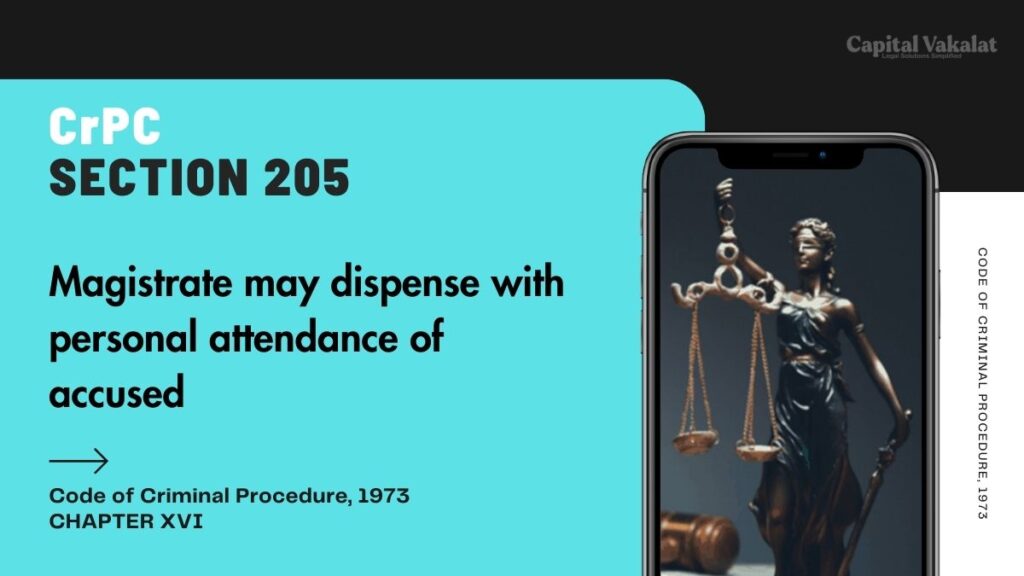The Code of Criminal Procedure (CrPC) is a critical component of the Indian legal system, outlining the procedural aspects of criminal law. One of its significant provisions is Section 205, which grants magistrates the discretion to dispense with the personal attendance of the accused. This provision plays a pivotal role in ensuring that justice is administered efficiently while considering the practical difficulties faced by the accused.

This article delves into the nuances of Section 205 CrPC, examining its implications, practical applications, and the balance it strikes between judicial efficiency and the rights of the accused.
Bare Act. Section 205 Cr.P.C.
Magistrate may dispense with personal attendance of accused.
(1) Whenever a Magistrate issues a summons, he may, if he sees reason so to do, dispense with the personal attendance of the accused and permit him to appear by his pleader.
(2) But the Magistrate inquiring into or trying the case may, in his discretion, at any stage of the proceedings, direct the personal attendance of the accused, and, if necessary, enforce such attendance in the manner hereinbefore provided.
Understanding Section 205 CrPC
Section 205 CrPC: An Overview
Section 205 of the CrPC allows a magistrate to dispense with the personal attendance of the accused in court. Instead, the accused can be represented by their legal counsel, except when their presence is deemed necessary for the proceedings. This provision provides flexibility, particularly in cases where the accused faces genuine hardships in appearing before the court.
Historical Context of Section 205 CrPC
The inclusion of Section 205 in the CrPC was a response to the need for a more pragmatic approach to criminal proceedings. Historically, the Indian legal system recognized the importance of balancing the accused’s rights with the practicalities of the judicial process. This section was introduced to address the challenges faced by accused individuals, such as those residing in distant locations, suffering from health issues, or experiencing other significant hardships.
The Magistrate’s Discretion
Scope of Magistrate’s Discretion
The discretion granted to magistrates under Section 205 CrPC is broad, allowing them to consider various factors when deciding whether to dispense with the accused’s personal attendance. These factors include the nature of the offense, the accused’s circumstances, and the potential impact on the judicial process. Magistrates are empowered to make decisions that best serve the interests of justice, ensuring that the legal process remains both fair and efficient.
Criteria for Exercising Discretion
While the discretion under Section 205 CrPC is extensive, magistrates must exercise it judiciously. They must consider whether the accused’s absence would hinder the proceedings or prejudice the prosecution. Additionally, the magistrate should assess whether the accused has a genuine reason for not appearing in person, such as medical issues or significant travel challenges.
Practical Applications of Section 205 CrPC
Legal Representation in Court
One of the primary applications of Section 205 CrPC is allowing the accused to be represented by their legal counsel instead of appearing in person. This provision is particularly beneficial in cases involving minor offenses or where the accused’s presence is not crucial for the progress of the case. Legal representation ensures that the accused’s rights are safeguarded while enabling the court to proceed with the case efficiently.
Medical and Logistical Considerations
Section 205 CrPC is often invoked in cases where the accused is unable to attend court due to medical reasons. For instance, if an accused person is hospitalized or suffers from a severe illness, the magistrate can permit their absence. Similarly, logistical challenges, such as residing in a different state or country, can also be grounds for dispensing with personal attendance.
Challenges and Criticisms
Ensuring Judicial Fairness
Despite its advantages, Section 205 CrPC has faced criticism regarding its potential misuse. Critics argue that allowing accused individuals to avoid court appearances might lead to delays in the judicial process or give an impression of preferential treatment. Ensuring that the magistrate’s discretion is exercised fairly and consistently is crucial to maintaining the integrity of the legal system.
Balancing Efficiency and Rights
Another challenge is striking the right balance between judicial efficiency and the rights of the accused. While Section 205 CrPC aims to streamline proceedings and accommodate genuine hardships, it must not compromise the accused’s right to a fair trial. Judicial officers must carefully weigh these considerations to ensure that justice is both swift and fair.
Section 205 CrPC in Practice
Case Studies and Precedents
Examining case studies and judicial precedents provides valuable insights into the application of Section 205 CrPC. Courts have interpreted this provision in various ways, setting important precedents for its use. Analyzing these cases helps understand how magistrates exercise their discretion and the factors influencing their decisions.
Judicial Interpretations and Guidelines
Over the years, higher courts in India have provided guidelines on the application of Section 205 CrPC. These guidelines help magistrates make informed decisions, ensuring consistency and fairness in their rulings. Understanding these judicial interpretations is essential for comprehending the broader implications of this provision.
Conclusion
Section 205 CrPC is a vital provision in the Indian criminal justice system, offering flexibility and practical relief to the accused while ensuring that the judicial process remains efficient. The discretion granted to magistrates under this section must be exercised judiciously, balancing the interests of justice with the rights of the accused. By understanding the nuances of Section 205 CrPC and its practical applications, legal practitioners and the judiciary can uphold the principles of fairness and efficiency in criminal proceedings.